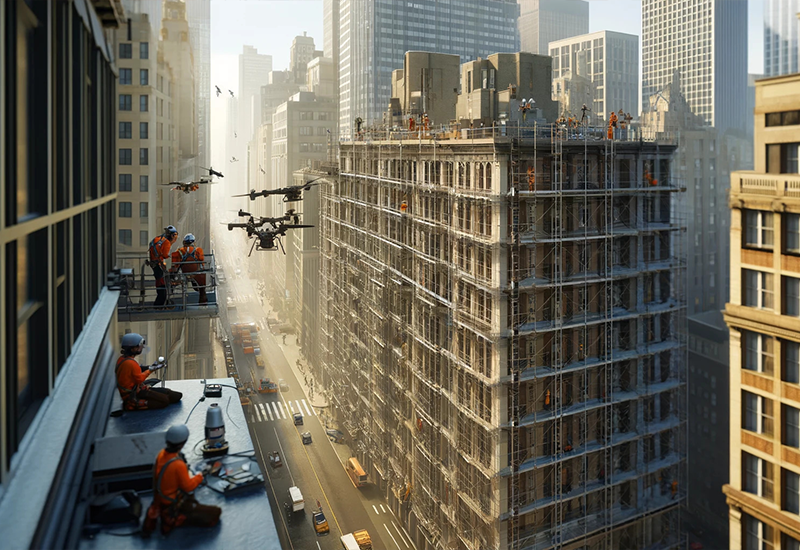
Local Law 11 NYC mandates that all buildings taller than six stories undergo periodic facade inspections to ensure structural integrity and public safety. This law, aimed at preventing incidents caused by facade deterioration, requires property owners in New York City to comply strictly to avoid penalties. Understanding Local Law 11 NYC is crucial for maintaining not only compliance but also the long-term well-being of both the buildings and their occupants.
Table of Contents
What is Local Law 11 in NYC?
Local Law 11, formally known as the Facade Inspection Safety Program (FISP), plays a pivotal role in ensuring the safety of buildings in New York City. Under this law, any building that exceeds six stories must have its exterior walls and facades inspected every five years. This regulation was established to prevent accidents related to falling debris, which are a significant concern in densely populated urban areas like NYC. The primary goal? To ensure that all pedestrians walking near such structures are safe from potential harm.
History and Evolution of Local Law 11
The inception of what is now known as Local Law 11 dates back to the 1980s. Following a series of incidents where falling debris from buildings caused severe safety hazards, the city introduced Local Law 10 in 1980. However, this earlier version only required the inspection of street-facing facades. In response to continuing safety concerns and the need for a more comprehensive approach, authorities revised and expanded the law as Local Law 11 in 1998 to include all exterior walls.
The Inspection Process
Let’s walk through what the inspection process under Local Law 11 typically looks like:
- Initial Inspection: The first step is a thorough visual inspection of the building’s exterior. This task is carried out by qualified professionals who are specially trained to spot potential safety hazards on facades.
- Report Submission: After the inspection, a qualified professional meticulously compiles the findings into a detailed report. They then submit this report to the Department of Buildings for review, ensuring that they document and make all observations accessible for necessary regulatory oversight.
- Repair and Maintenance: If the inspection report identifies any unsafe conditions, the building owner must take immediate steps to rectify these issues. This might involve minor repairs to address wear and tear, or possibly extensive renovations if major risks are identified. The aim is to mitigate any dangers as swiftly as possible to maintain safety standards.
Compliance with Local Law 11
Complying with Local Law 11 is essential for maintaining building safety in NYC. Here’s a closer look at what’s required:
1. Hiring a Qualified Exterior Wall Inspector (QEWI)
First things first, you’ll need to find a Qualified Exterior Wall Inspector. These professionals are certified to assess the safety of building facades. It’s crucial to choose someone with the right credentials to ensure thorough and reliable inspections.
2. Scheduling and Conducting Timely Inspections
Once you have a QEWI, the next step is scheduling the inspection. It’s important to plan these inspections within the mandated five-year intervals. Keeping on schedule prevents any lapses in compliance and ensures any potential issues are caught and addressed promptly.
3. Filing of Inspection Reports
After the inspection, the QEWI will prepare a detailed report of their findings. This report must be filed with the NYC Department of Buildings. Timely submission of this report is critical—it’s how the city keeps track of building safety and compliance.
4. Completing Necessary Repairs
If the inspection uncovers any unsafe conditions, you’re required to act fast. Completing necessary repairs not only complies with the law but also safeguards the residents and the public. Procrastination isn’t an option here; it’s about ensuring safety for everyone.
Costs and Penalties
Understanding the financial implications of Local Law 11 is key:
Table: Overview of Potential Costs and Penalties
| Aspect | Details |
| Inspection Costs | Costs vary depending on the building size and complexity of facades. |
| Fines for Non-Compliance | Can range from minor fines to major penalties for repeated offenses. |
| Repair Costs | Dependent on the extent of damage or deterioration found. |
Non-compliance with Local Law 11 can lead to substantial fines and serious legal implications. The financial strain of fines can be hefty, and the legal troubles that follow can complicate a building owner’s responsibilities even further.
Benefits of Compliance

Complying with Local Law 11 goes far beyond just dodging penalties—it significantly enhances the safety and longevity of buildings. Here’s why keeping up with this law is beneficial:
- Improved Safety: First off, the main goal of Local Law 11 is to ensure that all buildings are safe from structural dangers that could lead to accidents. Regular inspections help catch potential issues before they can cause harm, making the urban environment safer for everyone.
- Enhanced Building Longevity: Regular maintenance and repairs not only address immediate safety concerns but also contribute to the overall longevity of the building. When you fix issues as they arise, you prevent small problems from becoming big ones, ultimately extending the life of your property.
- Peace of Mind: For building owners and residents alike, knowing that your building complies with safety regulations offers great peace of mind. Understanding that professionals regularly check and maintain your building provides reassurance.
- Increased Property Value: Well-maintained buildings are also more attractive to potential buyers and tenants. Compliance with Local Law 11 can increase your property’s market value, as it assures potential buyers that the property is up to code and free from major defects.
- Better Relationships with Regulatory Bodies: Staying compliant helps foster a positive relationship with city regulators. When you consistently meet safety standards and become known for it, you are likely to face fewer inspections and less scrutiny, which makes your interactions with regulatory bodies smoother and more straightforward.
Challenges and Considerations
Implementing Local Law 11 is not without its hurdles. Building owners often face several challenges that need careful management to balance against the undeniable benefits of compliance. Let’s delve into some of these challenges:
Financial Burdens
One of the most significant challenges is the financial impact. Inspections, repairs, and the potential retrofitting of buildings to meet current standards can be costly. For some property owners, identifying multiple issues during an inspection can make these expenses daunting.
Logistical Issues During Inspections
Coordinating inspections can also be a logistical headache. It involves not only scheduling with a Qualified Exterior Wall Inspector but also ensuring that the inspection does not overly disrupt building operations or tenant activities. For larger buildings, this can become particularly complex.
Timing and Planning
The required frequency of inspections—every five years—means that owners need to plan well in advance to ensure compliance. This planning must account for the time required to carry out repairs if any issues are identified, which can be a tight timeline for some.
Regulatory Complexity
Keeping up with the nuances of Local Law 11 can also be challenging due to its regulatory complexity. The law and its requirements can evolve, and staying informed of these changes is crucial but can be time-consuming.
Resistance from Tenants
In some cases, there might be resistance or lack of cooperation from tenants, especially if repairs are intrusive or require temporary relocation. Carefully managing tenant relations is crucial to completing the necessary work without significant disputes.
Balancing Challenges with Benefits
Despite these challenges, the benefits of compliance—such as enhanced safety, building integrity, and legal peace of mind—often outweigh the difficulties. Effective building management involves anticipating these challenges and planning strategically to address them while keeping the benefits in focus.
Conclusion:
Compliance with Local Law 11 NYC not only enhances building safety but also protects against potential legal issues and fines. If you are a building owner or manager in need of a professional contractor for Local Law 11 NYC, understanding these requirements is crucial. For expert assistance, feel free to contact us at +(1) 917-477-9667 to ensure your building meets all safety standards under Local Law 11 NYC.
FAQs:
Q: What is Local Law 11 NYC and who does it affect?
A: Local Law 11 NYC is a regulatory requirement that mandates periodic façade inspections for buildings over six stories high in New York City. It affects building owners and managers who are responsible for ensuring these buildings are safe and well-maintained.
Q: How often must inspections be conducted under Local Law 11 NYC?
A: Under Local Law 11 NYC, building facades must be inspected every five years. This regular assessment helps to identify any potential structural issues early, ensuring timely maintenance and repairs.
Q: What are the penalties for non-compliance with Local Law 11 NYC?
A: Failing to comply with Local Law 11 NYC can lead to significant fines, legal actions, and increased scrutiny from the Department of Buildings, emphasizing the importance of timely facade inspections.
Q: Can tenants report non-compliance of Local Law 11 NYC?
A: Yes, tenants can report suspected non-compliance with Local Law 11 NYC to the NYC Department of Buildings, who will then investigate and take necessary action if the building has not met inspection requirements.
Q: What steps should be taken to comply with Local Law 11 NYC?
A: To comply with Local Law 11 NYC, building owners should hire a qualified inspector, schedule and perform the required inspections, and promptly make all necessary repairs to maintain façade safety and integrity.


